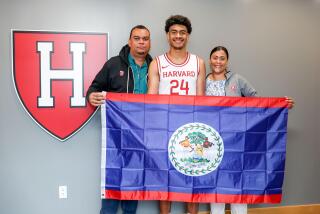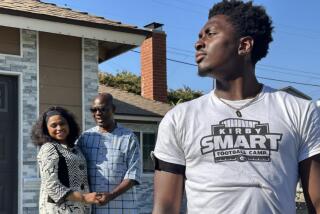Degree of Difficulty
- Share via
Emeka Okafor spent enough time in the Arizona State pool taking care of his chronically sore back during the Phoenix Regional that somebody finally told the Connecticut center he was a regular Mark Spitz.
At long last, the Academic All-American who turned down an opportunity to apply for a Rhodes Scholarship was stumped.
“Forgive me,” he said later, furrowing his brow and still uncertain. “Spitz?”
Considering Okafor wasn’t born until 1982, a decade after Spitz won seven gold medals in the 1972 Munich Olympics, the gap in his knowledge is understandable.
“The Michael Jordan of swimming,” someone told Okafor, and he repeated the phrase, unlikely to need prompting again.
Because he is the son of Nigerian immigrants and was born in Houston, it’s natural for people to draw comparisons between Okafor and Hakeem Olajuwon, who spent all but one year of his college and pro career playing in Houston.
But Okafor is much more David Robinson, a tremendous shot blocker with an increasingly effective offensive game, a princely manner, unusual intelligence and a toothpaste-commercial smile.
“That guy’s an MVP, an NBA champion,” Okafor said of Robinson. “I have a ways to catch up to him, but I’m honored to be compared to him.”
It is not only Okafor’s unpredictable back injury that has caused Connecticut concern going into the Final Four. (He sat out two games in the Big East tournament because of back spasms related to a stress fracture, but said his back has been “fine” during the NCAA tournament.)
He also suffered a shoulder “stinger,” or minor nerve injury, during the regional final against Alabama on Saturday.
Connecticut received good news Monday when results of an MRI exam on Okafor’s neck and right shoulder came back normal, and he was cleared to practice today.
For Okafor, there will be something very final about this Final Four. It will mark the end of his college career.
Only a junior, he’ll graduate in May with a degree in finance and a grade-point average close to 3.8.
The plan to turn pro after graduating in three years has been in place since he arrived at Connecticut, and Coach Jim Calhoun has been behind him all the way.
Okafor has done so well, though, that Calhoun and Ted Taigen, an associate professor of biology who is the team’s faculty advisor, were among those who encouraged Okafor to apply to be a Rhodes Scholar, the prestigious fellowship Bill Bradley won after an All-America basketball career at Princeton.
Okafor wrestled with the decision, then declined.
“That was a nice thing, but I felt that wasn’t really the road I wanted to go down,” he said. “It’s a big honor, but what would it really do for me? Would I be able to go through with it? I mean, for me, if I got to be a Rhodes Scholar, I’d have to go to Oxford, and I didn’t really plan on doing that.”
The reason: There is no NBA team in England.
“Not last time I checked,” Okafor said with a laugh.
Calhoun calls Okafor, a first-team All-American who led the nation in blocked shots with 4.2 a game and is tied for seventh in NCAA history with 437 in his career, a “once in a lifetime” player and person. (He averaged 17.4 points and 11.6 rebounds this season and has been a first-team Academic All-American the last two years.)
“The university has a 30-second public announcement spot that starts, ‘Hi, I am Emeka Okafor, Academic All-American,’ ” Calhoun said.
“In the commercial, it does not mention basketball at all. If the university has seen fit for him to be the poster person for our university as a student-athlete, that tells you what the university thinks of him.”
Rice University, in Okafor’s hometown of Houston, was brokenhearted when he didn’t stay home.
Okafor wanted to go to Stanford but didn’t get an offer.
“Yeah. I liked them a lot, but things didn’t work out. They didn’t have enough scholarships,” he said.
Bob Knight came calling too.
“I was surprised. He was a real likable guy,” Okafor said. “I expected him to come in throwing chairs around or something. He sat down, told some jokes, made us laugh, made us feel real comfortable.”
Okafor chose to go elsewhere
“Um, I don’t know. I didn’t really feel ... Texas Tech ... um,” he said.
Once at Connecticut, he needed little more than 2 1/2 years to complete his academic work. This semester, he is enrolled in only a peer-counseling internship and an invitation-only finance seminar in which students invest a portion of the university’s endowment.
“It’s a couple of hundred thousand,” Okafor said. “We bought Pfizer, Harley-Davidson. I think we ended up getting a little bit of Microsoft.”
He entered Connecticut with 10 or 12 credits he earned through high school coursework, and tested out of a business calculus course by taking the book home for a weekend or so of cramming. He got a B, and despite rumors of perfectionism, was pleased with the time-spent-to-grade-earned ratio.
“Nah, I’m reasonable,” Okafor said.
He has a stock answer when he is asked how he has achieved all he has in school while playing such a high-profile sport: “Time management.”
That amuses Taigen.
“I always think it’s funny he says that,” he said. “It’s like pointing to the Sistine Chapel and saying, ‘You’ve got to have good brushes or mix the paint right,’ ” he said. “Well, yeah, but you have to have a sense of beauty and an aesthetic vision. That’s what really motivates it.
“The real issue is the pride that drives him, though he would never say it himself.”
Okafor will say the example of his parents taught him well.
His father, Pius, lived in a refugee camp during Nigeria’s civil war, and his grandfather died in the camp.
After immigrating to the U.S., Pius earned a degree at Texas Southern while pumping gas at night to earn money. He since has earned two master’s degrees and is working on a doctorate in pharmacy at Missouri Kansas City.
Okafor’s mother, Celestina, was similarly dedicated.
“Honestly, as far as the classroom, my parents never had to get on me. Whatever they did to make me the way they did, they did real early,” Okafor said. “I always hated going to school without having my homework finished, but yet I never remember my parents saying, ‘Emeka sit down, do your homework.’
“That’s just the way they were. They were hard workers. My mom went to nursing school and also worked at the same time. I would see their examples and try to emulate that.”
On Connecticut road trips, Okafor has sometimes come back from a game, ordered a bunch of food and fallen asleep, then awoken at 1 or 2 a.m. only to study until 5 or 6 a.m.
Anyone out in the hallway might have found him wandering about, taking a study break at dawn.
That’s not time management. That’s drive and discipline.
“It’s all part of the way he defines himself,” Taigen said. “He’s so prideful about doing things the right way.”
Okafor would prefer to downplay all the attention given to his academic success, telling you there are probably student-athletes at smaller schools “in Idaho or Iowa” doing the same thing, without as much publicity.
Taigen is quite certain Okafor is special to do what he has at the level he has done it.
“He was a very, very good student in high school, but I would not have necessarily projected the achievement here at UConn from his high school profile,” Taigen said. “He really has done spectacularly here.”
Honestly, Okafor seems as if he might prefer to be known as an accomplished athlete-student, not the other way around.
“My first true love was football,” he said. “I always wanted to be a professional football player. I was a huge Oilers fan -- when the Oilers were [in Houston].
Then in high school, my freshman year, I had an epiphany: ‘Dang, I’m 6-8, a buck-eighty [180 pounds]. I’m going to get smashed or split in two one of these days.’ So I said, ‘All right, I’m going to stick to basketball.’
“I always wanted to play professional sports. I’m not stupid. I know not everyone’s going to be able to play a sport. Not everybody’s going to be a professional. So I figured I’d better not have all my eggs in one basket and have them break.”
It looks as if the only thing that’s broken is the mold.
More to Read
Go beyond the scoreboard
Get the latest on L.A.'s teams in the daily Sports Report newsletter.
You may occasionally receive promotional content from the Los Angeles Times.










